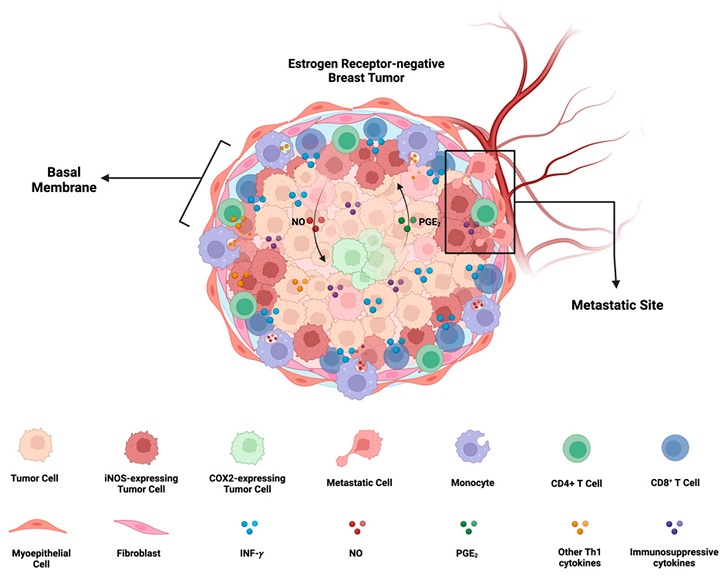Targeting Key Enzymes NOS2 and COX-2 To Halt Aggressive Breast Cancer Progression
Nikhil Prasad Fact checked by:Thailand Medical News Team Jun 02, 2024 1 year, 8 months, 3 weeks, 5 days, 7 hours, 24 minutes ago
Breast cancer, a disease that affects millions of people worldwide, is a complex and aggressive illness. Researchers have been working tirelessly to understand its underlying mechanisms and find effective treatments. Among the many factors contributing to the progression of breast cancer, two enzymes: Nitric Oxide Synthase 2 (NOS2) and Cyclooxygenase-2 (COX-2) - have emerged as significant players. This
Breast Cancer News report delves into the roles of NOS2 and COX-2 in breast cancer, highlighting their impact and potential as targets for new therapies.
 iNOS/COX2 co-expression and its effects on ER- breast cancer progression: In ER- breast cancer, iNOS and COX2 exhibit orthogonal expression patterns. iNOS niches are located at the stroma-tumor interface, preventing the penetration of CD8+ T cells into the tumor, and are associated with a metastatic phenotype. On the other hand, COX2 niches are deeper within the tumor core, near immune-desert regions. There exists a positive feedforward loop between iNOS and COX2, where iNOS-derived nitric oxide (NO) induces COX2 activity, and COX2-derived PGE2 induces iNOS. The formation of these iNOS and COX2 niches depends on the presence of INF-γ-secreting cells, such as CD8+ T cells, and may be potentiated by other Th1 cytokines like TNF-⍺ and IL-1β. Furthermore, NO and PGE2 have the potential to induce the production of immunosuppressive cytokines such as IL-10 and TGF-β.
Understanding Nitric Oxide and Reactive Nitrogen Species
iNOS/COX2 co-expression and its effects on ER- breast cancer progression: In ER- breast cancer, iNOS and COX2 exhibit orthogonal expression patterns. iNOS niches are located at the stroma-tumor interface, preventing the penetration of CD8+ T cells into the tumor, and are associated with a metastatic phenotype. On the other hand, COX2 niches are deeper within the tumor core, near immune-desert regions. There exists a positive feedforward loop between iNOS and COX2, where iNOS-derived nitric oxide (NO) induces COX2 activity, and COX2-derived PGE2 induces iNOS. The formation of these iNOS and COX2 niches depends on the presence of INF-γ-secreting cells, such as CD8+ T cells, and may be potentiated by other Th1 cytokines like TNF-⍺ and IL-1β. Furthermore, NO and PGE2 have the potential to induce the production of immunosuppressive cytokines such as IL-10 and TGF-β.
Understanding Nitric Oxide and Reactive Nitrogen Species
Nitric oxide (NO) is a small molecule that plays various roles in the body, including regulating blood pressure and immune responses. However, its role in cancer is a double-edged sword. At different concentrations, NO can either support or inhibit cancer growth. NO is produced by enzymes called nitric oxide synthases (NOS), and NOS2 is one of the key enzymes involved.
Reactive nitrogen species (RNS) are molecules derived from NO that can damage cellular components. The balance between NO and RNS is crucial for maintaining normal cellular functions. When this balance is disrupted, it can lead to cancer progression.
The Role of NOS2 in Cancer
NOS2 is known to produce large amounts of NO in response to inflammation and other signals. In many cancers, including breast cancer, high levels of NOS2 are associated with poor survival rates. NOS2 influences cancer in several ways:
Promoting Cell Growth: NO can stimulate cancer cells to grow and divide more rapidly.
-Aiding Metastasis: NO helps cancer cells spread to other parts of the body.
Chemotherapy Resistance: High levels of NO can make cancer cells less responsive to treatment.
-Immune Suppression: NO can suppress the immune system, allowing cancer cells to evade immune attacks.
COX-2: Anot
her Player in Cancer Progression
Cyclooxygenase-2 (COX-2) is another enzyme that plays a significant role in inflammation and cancer. COX-2 produces prostaglandins, which are lipid compounds that promote inflammation, pain, and fever. In cancer, COX-2 has been found to contribute to tumor growth and spread.
The NOS2 and COX-2 Connection
Recent studies have shown that NOS2 and COX-2 often work together to promote cancer progression. This partnership creates a vicious cycle:
-Positive Feedback Loop: NOS2 and COX-2 enhance each other’s expression, leading to increased levels of NO and prostaglandins.
-Driving Aggressiveness: This loop drives the aggressiveness of cancer, making it more challenging to treat.
-Immune Evasion: The combination of high NO and prostaglandins helps cancer cells evade the immune system.
Targeting NOS2 and COX-2 for Treatment
Given their roles in cancer progression, NOS2 and COX-2 are attractive targets for developing new treatments. There are two main strategies to target these enzymes:
-Direct Inhibition: This approach involves using drugs to directly inhibit the activity of NOS2 and COX-2.
-Indirect Inhibition: This method targets the signals that lead to the production of NOS2 and COX-2, thereby reducing their levels indirectly.
Potential Therapies
Researchers are exploring various compounds to inhibit NOS2 and COX-2. Some promising candidates include:
-Non-Steroidal Anti-Inflammatory Drugs (NSAIDs): These drugs, like aspirin and ibuprofen, can inhibit COX-2 and reduce inflammation.
-Natural Compounds: Certain compounds found in cruciferous vegetables, such as sulforaphane, have shown potential in inhibiting NOS2 and COX-2.
-Selective Inhibitors: Drugs specifically designed to target NOS2 or COX-2 are being developed and tested in clinical trials.
Conclusion: Hope for the Future
Understanding the roles of NOS2 and COX-2 in breast cancer provides valuable insights into the disease’s progression and opens up new avenues for treatment. By targeting these enzymes, we can potentially develop therapies that are more effective in preventing and treating aggressive forms of breast cancer. While more research is needed, the future looks promising, and the fight against breast cancer continues with renewed hope and determination.
The study findings by the research team from U.S National Institutes of Health, MD-USA, Frederick National Laboratory for Cancer Research, Leidos Biomedical Research Inc., MD-USA and Universidade de São Paulo-Brazil were published in the peer reviewed journal: International Journal of Molecular Sciences.
https://www.mdpi.com/1422-0067/25/11/6103
For the latest
Breast Cancer News, keep on logging to Thailand Medical News.
Read Also:
https://www.thailandmedical.news/news/indonesian-study-finds-soy-based-tempeh-s-isoflavones-can-inhibit-breast-cancer-via-mir-7-5p-upregulation
https://www.thailandmedical.news/news/study-links-human-papilloma-virus-epstein-barr-virus-and-cytomegalovirus-with-breast-cancer
https://www.thailandmedical.news/news/breaking-sars-cov-2-causes-aggressive-breast-cancer-progression-and-manipulates-tissue-stem-cells-in-the-tumor-microenvironment
